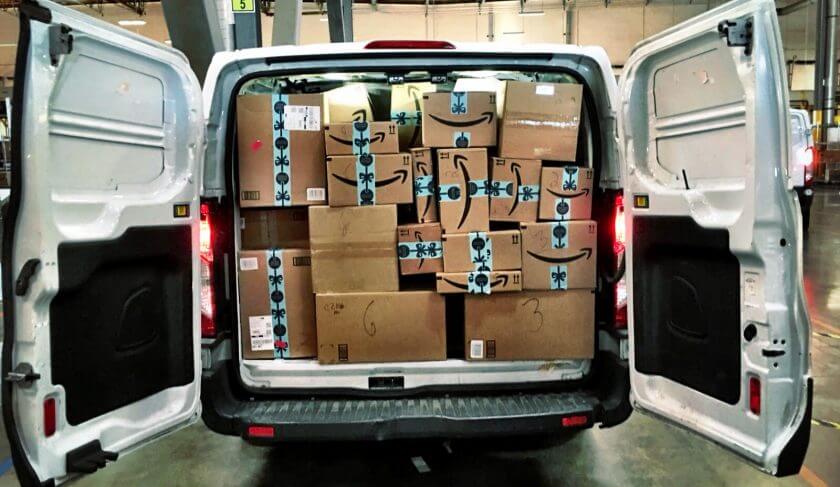
Not subscribed to HerMoney’s weekly newsletters yet? This is what you’re missing! Here’s a look at what we published in our “This Week In Your Wallet” newsletter, Tuesday, Aug. 11, 2020. Subscribe Today!
This Week In Your Wallet: Scams, Stamps and Student Loans
I received two Amazon packages last week — neither of which I ordered. The first, which came in an envelope was a kit of supplies (bowl, brush, clips, etc.) for coloring your hair at home. I chalked it up. I’d been talking about my new pandemic obsession with Madison-Reed somewhat incessantly. Maybe someone had sent me a gift? The second, well, didn’t enable me to do that. It was a box of random products, all made in China, including a multi-device charger, a scratch-off art book for kids, and a thin unmentionable item I originally thought was one of those dangling air-fresheners you see in taxis. It wasn’t.
Not knowing what to make of this, I did what I always seem to be doing of late. I Googled: “Received Amazon packages I didn’t order.” Bingo. Clark Howard and others were there to inform me: It’s a scam. This one’s called “brushing,” a variation of the Chinese Seed scam you may have read about earlier in the summer, where packets of seeds showed up in thousands of mailboxes. The ploy seems to be to boost the number of positive reviews by verified buyers that spur customers to buy for real. The more pressing danger is that this — and many other scams — are an indication that your personal information may have fallen into the wrong hands.
And — thanks, coronavirus — scams of all sorts are proliferating. Another Google search (this one for “scams on the rise” under the news tabs) told me to be on the alert for an uptick in phishing, work-from-home scams. online shopping scams, utility scams, and of course, COVID-19 scams. What to do? Use strong passwords. Change them regularly. Even better, use a password manager. Never give out personal information online or on the phone unless you initiated the interaction. And please, please, please freeze your credit. It’s the best free weapon you have against the sort of full-blown identity theft that can tie you and your finances up in knots for years. Here are my step-by-step instructions.
About Those Savings Rates…
And while we’re on the subject of my mail. In email last week, I received yet another notification that the interest rate on my High Yield Savings Account would be dropping — this time from 1% to .80%. (It also fell from 1.15% to 1% on June 30.) If you’re a saver, I’m sure you can commiserate. But I’m also getting a lot of questions about whether there’s a way to do better while still keeping your savings, well, safe.
HerMoney’s Dayana Yochim took on the challenge by exploring first, whether High Yield Savings Accounts are still worth it these days. Her verdict: Yes. Then she turned to the lesser-known alternative of a High Yield Checking Account. They’re a thing, and the interest rates can be substantially higher. The catch is that there’s usually a maximum balance on which you can earn that better rate, and you have to be willing to use your debit card to buy things a certain number of times each month (these accounts make their money on transaction fees,) Either way, if you’re looking for a solution, they’re worth checking out.
About That Student Loan Executive Order…
To say there’s a lot of confusion about what the President’s executive order extending the pause on federal (not private, only federal) student loan payments actually means is an understatement. For now, as we wait for additional details that the Department of Education says are forthcoming, here’s what you need to know. You do not have to make payments on those federally-backed student loans until January 2021. If you graduated last spring and were expecting your six-month grace period to expire this fall, it won’t expire until January 2021. If you do make payments, all the money you send in will go to principle — making a bigger dent in your loan balance than they would have otherwise. If you were pursuing Public Service Loan Forgiveness, it is unclear whether you have to start making payments again (as the CARES act previously teed up) as of September 31. Be careful here. Call your servicer and check. And if you believe that, even after the first of the year, you’re going to have trouble making your payments, now’s the time to start looking into income-based repayment programs that can help reduce the monthly load. For more, Nerdwallet’s Anna Helhoski broke it down very clearly here.
About Those Firehook Crackers….
If you haven’t tried them, they’ve been an object of pandemic obsession in my house — particularly the garlic and thyme variety. This week at the grocery store (my husband is still going about once every two weeks — a trip we supplement with a big haul from the farmer’s market) they were out of stock. So were napkins and Starbucks decaf coffee (ground). Bounty and the flour I’m still using to make sourdough (no, I’m not over it — and you wouldn’t be either if you tried this recipe for a sourdough cinnamon raisin breakfast bread) were back. The Wall Street Journal took up the task of explaining why some items are still off the shelves while others are back in stock. Meanwhile, let me know what you’re missing!
Have a great week!
Jean







